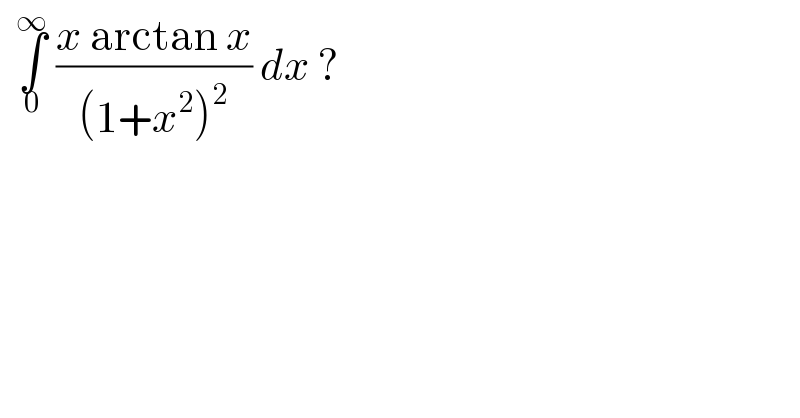
Question and Answers Forum
Question Number 123526 by bramlexs22 last updated on 26/Nov/20

Commented by liberty last updated on 26/Nov/20

Commented by bramlexs22 last updated on 26/Nov/20

Answered by Lordose last updated on 26/Nov/20
![I = ∫_( 0) ^( ∞) ((xtan^(−1) (x))/((1+x^2 )^2 ))dx IBP I = (1/2)∫_0 ^( ∞) (1/((1+x^2 )^2 ))dx − ∣((tan^(−1) (x))/(2(1+x^2 )))∣_0 ^∞ Ostrogradski method I = (1/4)[((x/(1+x^2 ))+tan^(−1) (x))]_0 ^∞ − (1/2)[((tan^(−1) (x))/((1+x^2 )))]_0 ^∞ I = (π/8)](Q123536.png)
Commented by bramlexs22 last updated on 26/Nov/20

Answered by Dwaipayan Shikari last updated on 26/Nov/20
![∫_0 ^(π/2) t sint cost dt t=tan^(−1) x =(1/2)∫_0 ^(π/2) tsin2t dt =−[(t/4)cos2t]^(π/2) +(1/8)[sin2t]_0 ^(π/2) dt =(π/8)](Q123538.png)
Commented by bramlexs22 last updated on 26/Nov/20

Answered by mathmax by abdo last updated on 26/Nov/20
![A =∫_0 ^∞ ((xarctanx)/((1+x^2 )^2 ))dx we integrate by parts u^′ =(x/((1+x^2 )^2 )) and v=srctsnx ⇒A =[−(1/(2(1+x^2 )))arctanx]_0 ^∞ +∫_0 ^∞ (1/(2(1+x^(2)) ))(dx/(1+x^2 )) =(1/2)∫_0 ^∞ (dx/((1+x^2 )^2 )) =_(x=tanθ) (1/2)∫_0 ^(π/2) ((1+tan^2 θ)/((1+tan^2 θ)^2 ))dθ =(1/2)∫_0 ^(π/2) cos^2 θ dθ =(1/4)∫_0 ^(π/2) (1+cos(2θ))dθ =(π/8) +(1/8)[sin(2θ)]_0 ^(π/2) =(π/8)+0 =(π/8) A =(π/8)](Q123629.png)
